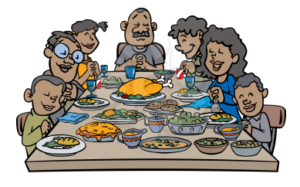Page Contents
If You Never Overeat Holiday Food…
 You really do not need to read this.
You really do not need to read this.
So instead, go do a good deed in your community and then relax.
If Holiday Food Does Cause You Weight Gain…
I assure you that it really does not have to. With a little shift in your outlook, you can enjoy all the pleasures of the holidays, including the food, without overeating. So, do a good deed for yourself and keep reading.
The Weight Gain & Holiday Food Link
My husband and I grew up in different cultures so when we first got together, part of getting to know one another was learning each other’s holidays. We quickly fell into the habit of talking about the Matzoh or London Broil holiday, Turkey or Latke day. Harmlessly funny as this was, it does illustrate a common problem faced by those who struggle to manage their weight. The feasting that goes with our holidays typically leads to weight gain.
Defining holidays, or any social gathering, in terms of the food involved causes three potential problems.
- First, it takes your focus off the social aspect of the gathering. In place of eager anticipation of seeing family or friends, your thoughts drift to Latkes and London Broil (or whatever’s on the menu). Perhaps your loved ones can tell it’s not them you’re excited to see, or perhaps not. So this only becomes a problem if you are not a very good actor.
 Regardless of your acting skills, over-focus on the food aspect of the gathering makes it difficult to avoid over-eating. Delicious food has a strong stimulus value. It naturally triggers you to eat. As a result, food remains on your mind long past when your belly has had enough. And as you have likely experienced, thinking about food can make you want to eat whether or not you’re hungry.
Regardless of your acting skills, over-focus on the food aspect of the gathering makes it difficult to avoid over-eating. Delicious food has a strong stimulus value. It naturally triggers you to eat. As a result, food remains on your mind long past when your belly has had enough. And as you have likely experienced, thinking about food can make you want to eat whether or not you’re hungry.- Finally, defining holidays in food terms creates the problem of making you feel deprived if you opt to skip some of the offerings. If Thanksgiving is all about slices of the three different pies your family serves and you decide that one slice of pie is a healthier dessert, it can feel like you are missing out on Thanksgiving rather than skipping two extra slices of pie that will make your belly hurt. If the holiday is about three slices of pie, you are definitely missing out.
 On the other hand, if it is about celebrating something or someone, the pie simply does not matter!
On the other hand, if it is about celebrating something or someone, the pie simply does not matter!
Self-talk to Stop Holiday Weight Gain
As I explain in A Diet is the Last Thing You Need, recognizing and correcting problematic self-talk that trips you up (cognitive distortions) is the first step toward better managing your behavior.
Start by thinking honestly about what the upcoming holidays or parties mean to you. Obviously, there are the official meanings that derive from honoring religious traditions or recalling the escapades of our ancestors. But think more deeply about what the holiday means to you emotionally.
For instance, consider Thanksgiving. Are you thinking about American history, visiting with particular people, or those three pies we discussed above? If Thanksgiving is about history or people, then skipping a couple of slices of pie—even skipping pie altogether—won’t make any difference to how much you can enjoy yourself. If it is about the pie, well … you see the problem don’t you?
I recall working with a patient who was distraught over his financial problems. With Christmas around the corner, he was in tears because he wasn’t going to be able to (his words) “buy Christmas” for his children. This loving father was in fact a devout Christian for whom Christmas was very much a religious observance. And yet he had slipped into the faulty thinking (cognitive distortion) drummed into our heads by media—that for someone to be happy, to feel loved, they must get lots of expensive stuff.
I am telling you this true story, not to make this bright man sound silly but to emphasize how dramatically cognitive distortions can affect our outlook. This intelligent, deeply religious man had lost sight of what mattered to him. And consequently ruined one of the most meaningful days in his year.
Well, almost ruined it.
Once we identified the distortion, he was able to logically challenge it and rescript his self-talk. (See How Does Cognitive Behavioral Therapy Work? for more detail on the process.) This lovely man was able not only to enjoy a meaningful holiday, but give his children something more lasting than 5-in-1 transformer toys. He gave them insight by modeling logical self-reflection.
What is Your Self-Talk About the Holiday?
What do you think about, say to yourself, when you think Holiday? What are the first few things that come to mind? Is it the traditional meaning behind the holiday, the people you usually celebrate with? Or is is the foods you will eat, or the hours in the kitchen spent to make those foods?
 Identify the words and images that come to mind and write them down.
Identify the words and images that come to mind and write them down.
Really! Do write them down. Seeing your thoughts in print make them into more tangible things that you can logically address. Without writing them, they are just ephemeral synaptic impulses that can flit into and out of your consciousness in a heartbeat.
Then figure out what you would say to a dear friend who told you that is what they are thinking in anticipation of the upcoming holiday. For instance, consider the following exchange between you (the logical one) and your friend who is struggling with a cognitive distortion:
Friend: Chanukah just isn’t Chanukah if I don’t eat a lot of potato latkes.
You: Why are latkes always served on Chanukah?
Friend: Frying the potatoes in oil symbolizes the ancient miracle when the Jews retook their temple from oppressors and a tiny amount of oil kept the holy lamp lit long enough for them to repel the enemy and get sufficient oil to rededicate the temple. Chanukah is a holiday that celebrates religious freedom.
You: Is that religious meaning important to you?
Friend: Oh yes! Although I’m not very religious, I believe that freedom to think and believe independently of the dominant culture is critical to a good life and a good society.
You: What else is important to you about the holiday?
Friend: I love that the whole family comes together. And the children get so excited about helping to light the colorful candles. And I do get a kick out of how many times my mom-in-law sets off the smoke alarm while cooking! We take bets on it every year.
You: If you ate only one serving of latkes, what would be left for you of the holiday?
Friend: Touché! I can eat fewer latkes. It will be Chanukah whether or not I give myself indigestion so why not skip the discomfort and focus on the joy?!

Self-Talk to Feel Good & Not Overeat
Taking the time to think through what upcoming events mean to you makes it much easier to develop a healthier mindset. One that will help you navigate social events comfortably interacting with others, and without over-eating and, equally importantly, without feeling deprived!
You can use the same questioning strategy for yourself as I illustrated above in the You/Friend scenario. Use the words you wrote down as the starting statement just as we did with Friend claiming Chanukah would be a bust without overeating, and then ask yourself the purpose behind those foods, what else you value about the event, and so on. Work through the process until you arrive at self-talk, a personal statement, that helps you enjoy the larger purpose of the event without stuffing your belly.
For more on changing unhealthy self-talk, see Cognitive Distortions—Are You Enough and Cognitive Habits & Nice Girls & Goats.
Enjoy the Holiday & Enjoy Holiday Food
In the final section of A Diet is the Last Thing You Need: Weight Loss & Maintenance Answers, I talk about what questions you should ask yourself to keep focused on your goals. The question I encourage everyone to ask themselves after they navigate a difficult food situation without overeating, is:
How has having chosen to reject this temptation negatively affected my quality of life?
In fact, we do this in therapy when a patient reports having gone to a food-centered event and not having overeaten. Because I was born with an over-developed sarcasm gene, I usually pose this question with a very concerned pained look on my face:
So, how horrible has it been to live your life since you didn’t have that extra slice of pie? 😉
You may be surprised to learn that nobody has ever reported that skipping an extra serving of anything has ruined their quality of life. (There’s my sarcasm gene again.) In fact, they usually report that they were surprised at how lovely a time they had despite it, and how physically comfortable they were at the end of the event.
Holiday Love
As the holiday season moves into full swing, shift your focus to what the gatherings mean to you. Cherish your time with loved ones, honor your traditions, and appreciate the fact that you have a good brain. One that allows you to think, assess, re-think, and enhance your life.

Wishing you a lovely holiday season filled with love, friendship, and meaningful days.


fantastic post thank you for sharing that with us